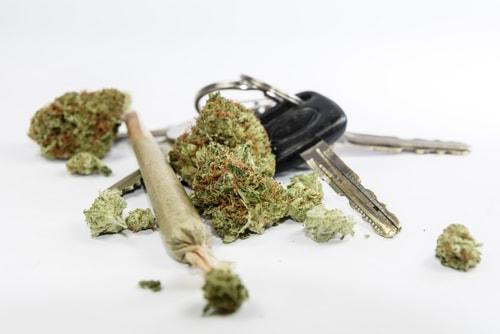Recent Blog Posts
Understanding the Illinois Bail System
 Bail is often mischaracterized on television and in the movies, as it seems as though a criminal defendant can simply pay some money and be released from all responsibility for their actions. A character wakes up in jail, for example, just in time for the guard to arrive saying that the character’s friend has posted bail. The episode or film then continues with no mention of the arrest again—case closed, right? Not even close.
Bail is often mischaracterized on television and in the movies, as it seems as though a criminal defendant can simply pay some money and be released from all responsibility for their actions. A character wakes up in jail, for example, just in time for the guard to arrive saying that the character’s friend has posted bail. The episode or film then continues with no mention of the arrest again—case closed, right? Not even close.
In reality, there is virtually no situation in which posting bail will end criminal proceedings against a person charged with a crime. Bail is not a fine to be paid in lieu of a different criminal sentence. Instead, bail is intended to help ensure that a criminal defendant responds as required and that he or she is afforded the due process of law.
After an Arrest
When a person is arrested for a criminal offense, he or she has the right to a preliminary hearing, in most cases, to determine if there is enough evidence for the case to proceed. Depending on when a person is arrested, getting him or her in front of a judge may take several days or even weeks. In many cases, the defendant will waive the preliminary hearing, but he or she still has the right to a trial. Thanks to overloaded court dockets, a trial may not be possible for a number of months. In the meantime, what happens to the suspect?
Local Authorities Crack Down on Drunk Boating
 For nearly four decades, broadcast airwaves, billboards, and other attention-grabbing resources have been used to raise awareness of the dangers of drunk driving. Of course, such efforts continue each year as a new class of young drivers takes to the roads in Illinois for the first time—teens who may not have ever really considered how a few drinks could affect their ability to handle a car.
For nearly four decades, broadcast airwaves, billboards, and other attention-grabbing resources have been used to raise awareness of the dangers of drunk driving. Of course, such efforts continue each year as a new class of young drivers takes to the roads in Illinois for the first time—teens who may not have ever really considered how a few drinks could affect their ability to handle a car.
Meanwhile, however, far less attention has been paid to the similar dangers of drunk boating or boating under the influence of alcohol or drugs. In fact, it is not uncommon for people to consider a boating trip as a type of tailgate party writ large—complete with copious amounts of alcohol and a corresponding lack of inhibitions. Thus, it often comes as a surprise when the operator of a boat is arrested and charged with boating under the influence.
Authorities Expect Uptick in Waterway Use
Common Mistakes Made By CDL Holders
 Commercial Driver’s License (CDL) holders go through a difficult process to obtain their licensure. Such drivers are held to a higher standard within the community, both on and off the clock. Whether in a company vehicle or a personal vehicle, their attention to their driving must be impeccable at the risk of losing their license, jeopardizing both their employment and their future. What are some of the top mistakes made by CDL holders that can result in traffic violations and put their licensure in danger?
Commercial Driver’s License (CDL) holders go through a difficult process to obtain their licensure. Such drivers are held to a higher standard within the community, both on and off the clock. Whether in a company vehicle or a personal vehicle, their attention to their driving must be impeccable at the risk of losing their license, jeopardizing both their employment and their future. What are some of the top mistakes made by CDL holders that can result in traffic violations and put their licensure in danger?
Attempting a Difficult Parking Spot to Avoid the Extra Walk
Did you know that most trucking accidents occur at truck stops? Some of these do involve truckers trying to pull into a closer and tougher parking spot than utilizing the ample space often available a few feet away. Large trucks do not have a small turning radius, and because of this, you should allow yourself the proper room for maneuverability to avoid a collision. While one accident may not lose your licensure, several just might. Remember that truck and trailer often move on different tracks, and the costs of repairing someone else’s vehicle may be upwards of $15,000 depending on the amount of damage.
Drugged Driving May Be a Factor in More Fatal Crashes Than Drunk Driving
 Late last month, the Governors Highway Safety Association (GHSA), in conjunction with the Foundation for Advancing Alcohol Responsibility, released a report that looked at fatal crashes from 2015 for which toxicology information was available. According to the report’s findings, illegal and prescription drugs were involved in 43 percent of crashes that resulted in the death of the driver while alcohol was involved in 37 percent of such incidents. This marks the first time since the issue has been thoroughly researched that drugged driving surpassed drunk driving as a factor in fatal accidents.
Late last month, the Governors Highway Safety Association (GHSA), in conjunction with the Foundation for Advancing Alcohol Responsibility, released a report that looked at fatal crashes from 2015 for which toxicology information was available. According to the report’s findings, illegal and prescription drugs were involved in 43 percent of crashes that resulted in the death of the driver while alcohol was involved in 37 percent of such incidents. This marks the first time since the issue has been thoroughly researched that drugged driving surpassed drunk driving as a factor in fatal accidents.
Study Limitations
The report acknowledged that the numbers are not quite as complete as the researchers would have liked, but the data in question is not always made available. Much of the study’s information came from the Fatal Analysis Reporting System (FARS) utilized by the National Highway Traffic Safety Administration (NHTSA). According to FARS statistics, less than 60 percent of fatally injured drivers in 2015 were tested for drugs. The numbers were slightly better for alcohol testing with nearly 71 percent of fatally injured drivers tested. In addition, FARS statistics rely on individual states to file reports regarding deadly accidents which does not always happen as expected.
Common Ways to Uncover Identity Theft Activity
 Identity theft crimes involve using sensitive personal information to steal money or property in a variety of ways, often remaining undetected until the victim discovers inconsistencies in his or her financial records. By the time this happens, the damage is usually already done and may take a significant amount of time to repair. Even when victims discover fraudulent charges or accounts they never opened early on, a great deal of work may be necessary—along with more than a few headaches—to dispute the charges and restore their standing with a financial institution.
Identity theft crimes involve using sensitive personal information to steal money or property in a variety of ways, often remaining undetected until the victim discovers inconsistencies in his or her financial records. By the time this happens, the damage is usually already done and may take a significant amount of time to repair. Even when victims discover fraudulent charges or accounts they never opened early on, a great deal of work may be necessary—along with more than a few headaches—to dispute the charges and restore their standing with a financial institution.
How Stolen Identities are Used
Using someone’s identity allows a thief to open new accounts under the victim’s name, make charges on his or her credit cards, and even make withdrawals from his or her bank accounts. Other common scenarios involve tax-related theft, where a person’s refund is stolen, or medical-related theft, where the victim’s identity is used to acquire medical treatment under his or her health insurance plan.
The Death of a Fetus in DUI Crash Can Lead to Serious Consequences
 Families who are expecting a child have high hopes for the future. If that future happens to be snatched away during an accident with an intoxicated driver, the end result can be catastrophic. A family loses a child they were planning for, and the intoxicated driver is left to deal with the guilt and consequences of their actions. In such a case, the consequences could include a felony DUI conviction.
Families who are expecting a child have high hopes for the future. If that future happens to be snatched away during an accident with an intoxicated driver, the end result can be catastrophic. A family loses a child they were planning for, and the intoxicated driver is left to deal with the guilt and consequences of their actions. In such a case, the consequences could include a felony DUI conviction.
Illinois Considers an Unborn Fetus a Life in DUI Accidents
Paying the price for an unborn fetus might seem unfair, but the state of Illinois considers it a life. This means you could potentially face the very same charges for the death of a fetus as you would have for the death of another human being. In short, you could be charged with an aggravated DUI, which is a felony charge in the state of Illinois.
Consequences of a Felony DUI in Illinois
In addition to having a DUI conviction on your driving record, suspension of your license, fines, administrative fees, and lost time from work, those facing felony DUI charges may experience a prison sentence, probation, and mandatory community service. They may also be required to pay restitution to the victim’s family. Further, having a felony on your criminal record can make it difficult to obtain housing and employment once you are released from prison. A felony DUI conviction also remains on your record for the rest of your life.
Be Thorough When Choosing a Defense Attorney
 When you are up against a criminal charge, the attorney you hire can have a massive impact on the outcome of your case. So, knowing this, how do you choose? How do you ensure, beyond all doubt, that your criminal defense attorney will represent you effectively and protect your interests? It all starts with performing your due diligence. Of course, the decision is always up to you, but following information may be able to help you find the attorney that is most suited to your specific needs.
When you are up against a criminal charge, the attorney you hire can have a massive impact on the outcome of your case. So, knowing this, how do you choose? How do you ensure, beyond all doubt, that your criminal defense attorney will represent you effectively and protect your interests? It all starts with performing your due diligence. Of course, the decision is always up to you, but following information may be able to help you find the attorney that is most suited to your specific needs.
Hire the Right Type of Lawyer
First thing is first: it is important that you hire an attorney who has experience with your particular situation. As an example, hiring an attorney who works only on divorce or immigration issues when you are facing drunk driving charges is probably a poor choice. Instead, turn to an attorney who has extensive knowledge and experience with sensitive criminal matters. These attorneys are more likely to recognize and plan for the unique challenges that may arise in your case.
When Is a DUI a Felony Charge?
 When you are charged with the criminal offense of driving under the influence (DUI), it has the potential to change your life forever. Regardless of whether you are ultimately convicted, your license can be suspended, leading to difficulties keeping your commitments—including work. If you are convicted, you could even spend time in jail.
When you are charged with the criminal offense of driving under the influence (DUI), it has the potential to change your life forever. Regardless of whether you are ultimately convicted, your license can be suspended, leading to difficulties keeping your commitments—including work. If you are convicted, you could even spend time in jail.
Basics of DUI Offenses
Just your first DUI offense can result in the loss of driving privileges for up to six months. In many cases—especially if it is your first offense—you are likely to qualify for a Monitoring Device Driving Permit which allows you drive legally while your license is technically suspended. Participation in this program, however, means that you must install a Breath-Alcohol Ignition Interlock Device (BAIID) in your vehicle. Before your car will start, you must use the BAIID to prove that your blood-alcohol content (BAC) is below the acceptable limits set by the program.
Drug Distribution and Trafficking
 Illinois has fairly strict laws about drug possession, distribution, and trafficking. The latter two are decidedly more serious, as one might imagine, but many become confused when dealing with the prosecution process. There are state and federal charges, with varying degrees of severity, and those unfamiliar with the law may have trouble determining which regulations apply to them and which do not.
Illinois has fairly strict laws about drug possession, distribution, and trafficking. The latter two are decidedly more serious, as one might imagine, but many become confused when dealing with the prosecution process. There are state and federal charges, with varying degrees of severity, and those unfamiliar with the law may have trouble determining which regulations apply to them and which do not.
Classifying Drugs
The Illinois Controlled Substances Act sets forth information on which drugs are classified under which schedule, and grants the state of Illinois the authority to reschedule any drug if it is rescheduled under the corresponding federal law. There are five schedules, with Schedule I including the most dangerous drugs and Schedule V listing the least dangerous.
There are a number of factors that go into federal and state authorities classifying a drug under a certain schedule, including but not limited to the potential for abuse, the degree to which the drug can be used for legitimate medical purposes, and potential long-range effect on individual and public health. This is relevant in terms of assessing distribution and trafficking offenses because public health is a concern. A drug may be is placed on a certain schedule due to widespread fear of abuse or belief in its potential to cause long-term effects, distribution or trafficking of the drug can cause significant harm to public health.
Collateral Costs of a DUI Conviction
 A conviction on charges of driving under the influence (DUI) is likely to have costs that extend beyond fines, license revocation, and jail time. It can mean, among other things, ineligibility for federal welfare benefits, an increased possibility of deportation, ineligibility for reductions in car insurance rates, and mandatory alcohol education counseling. If you or someone you know is facing a DUI charge, it is essential to understand the full consequences of a conviction.
A conviction on charges of driving under the influence (DUI) is likely to have costs that extend beyond fines, license revocation, and jail time. It can mean, among other things, ineligibility for federal welfare benefits, an increased possibility of deportation, ineligibility for reductions in car insurance rates, and mandatory alcohol education counseling. If you or someone you know is facing a DUI charge, it is essential to understand the full consequences of a conviction.
Compromised Civil Liberties
After two DUI convictions, any further conviction will be classified as a felony. A conviction for a felony offense not only means more severe sentencing requirements, but also the loss of civil liberties, such as the right to vote, the right to possess a firearm, and the right to get a passport. Some of these can be eventually restored but the process of doing so may be difficult and expensive.







